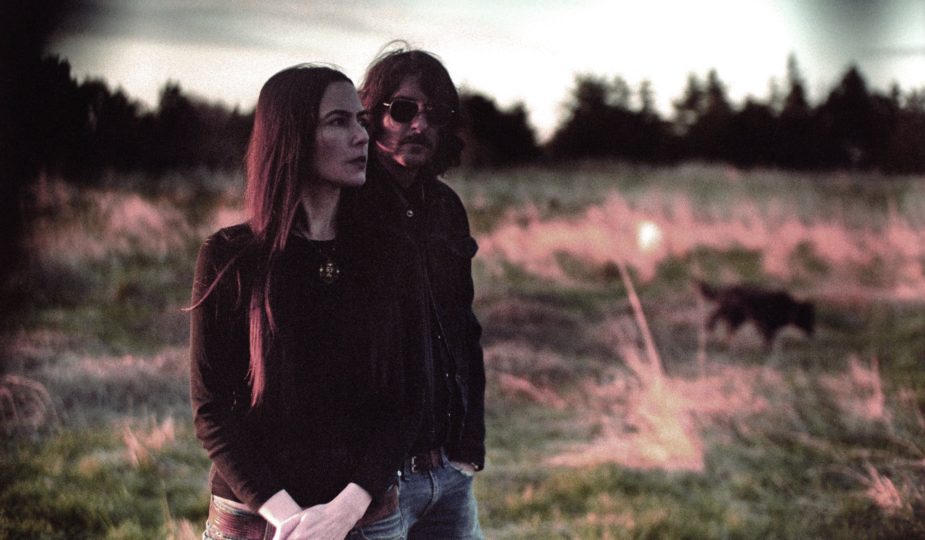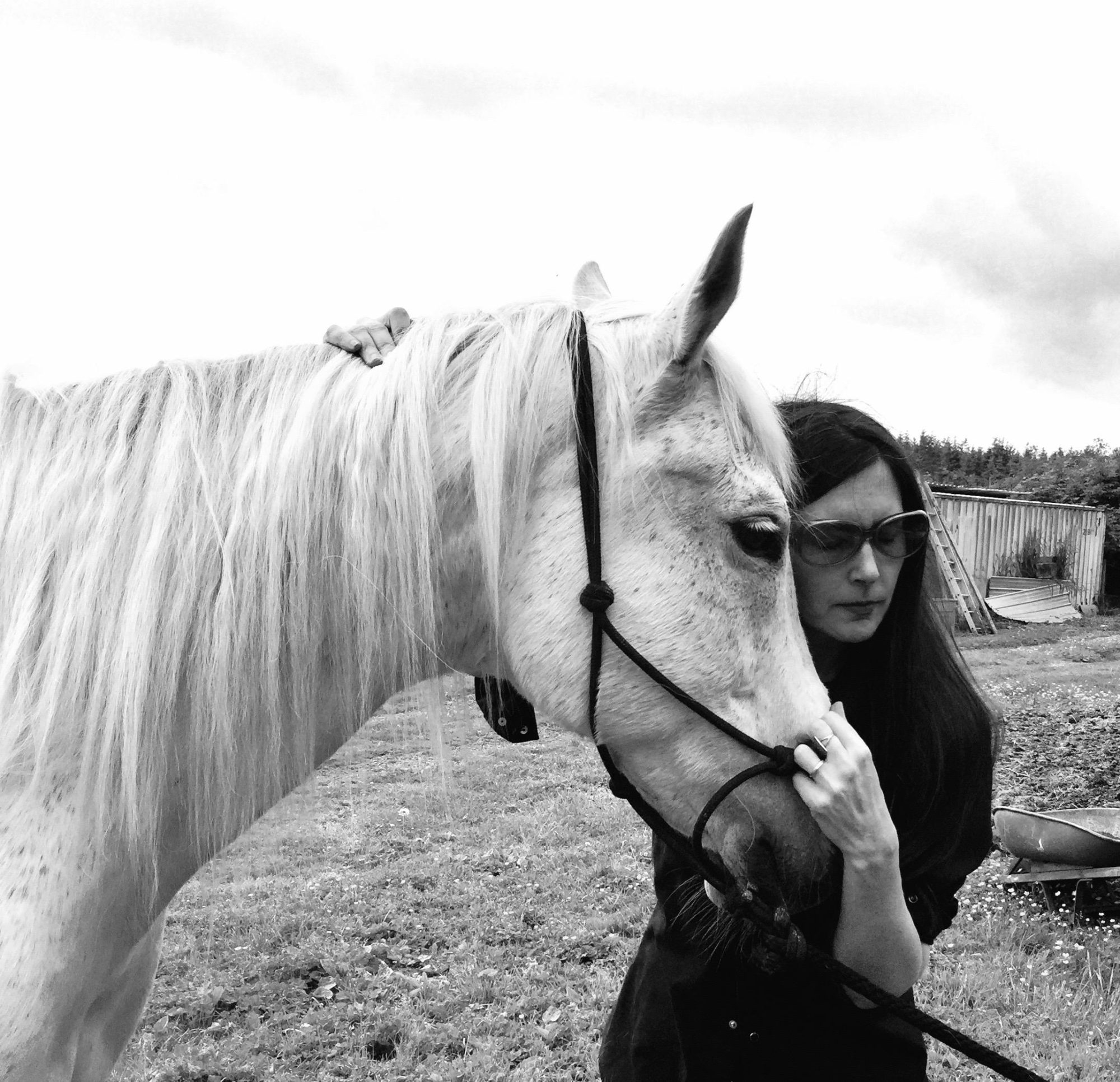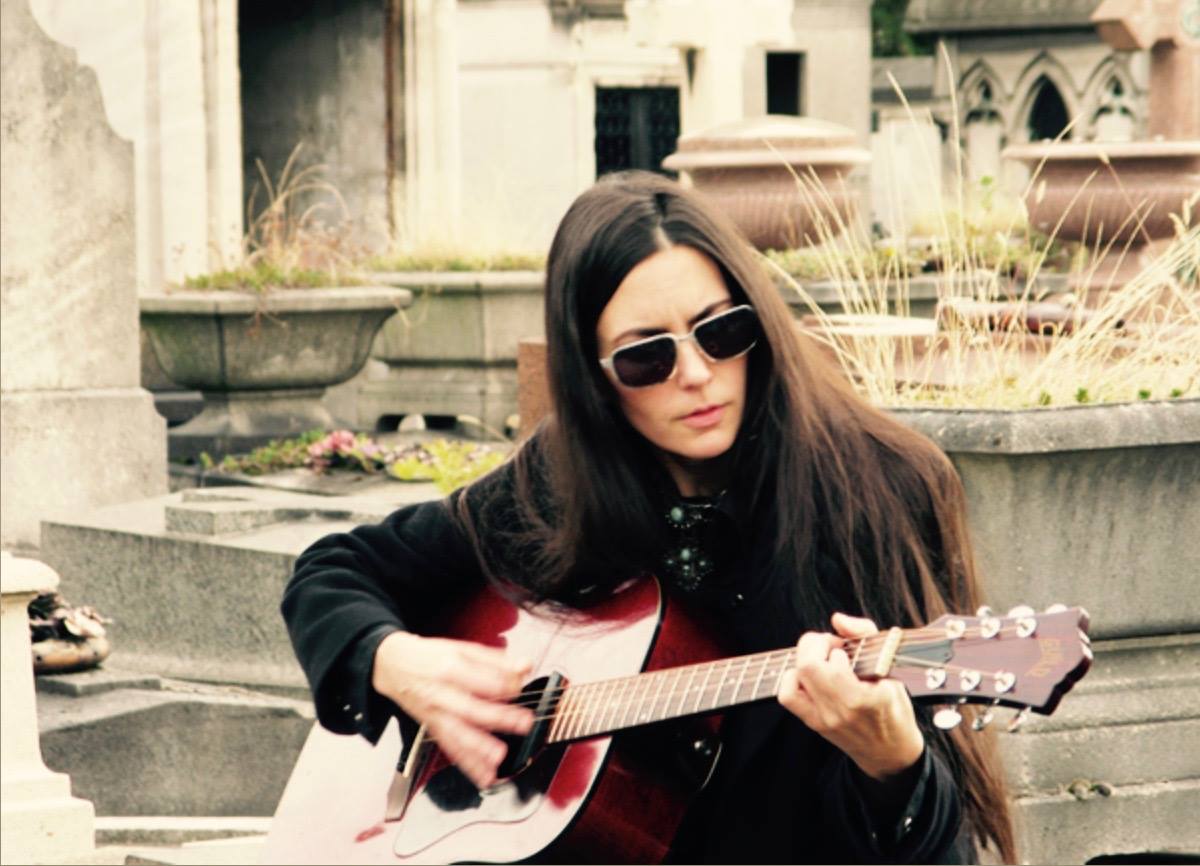
Amazon Moon ~ An Interview with Jesse Sykes
Jesse Sykes was born on July 17, 1967 in Mount Kisco, New York. She studied photography at the Rhode Island School of Design before moving to Seattle in 1990. In Seattle, she met guitarist Phil Wandscher and they formed a band together: Jesse Sykes and the Sweet Hereafter.
From 2002 – 2011, Sykes and Wandscher released four records. Sykes’ lyrics and vocals have been acclaimed as “shamanic” (The Stranger), “smoky” (Exclaim), “spooky” (Paste), and “subterranean” (Thom Jurek, All Music Guide). The New York Times called it “spellbound music, rapt in fatalism and sorrow.”
An interview by Mark Lager
Your recent song, “Dewayne” (released in the summer of 2018), is about Dewayne Pomeroy who tragically committed suicide “the day before he turned seventeen, which was also the day before he was to be released from juvenile retention.” You have previously mentioned Seattle (for example, the Puget Sound in “Lonely Still” from debut Reckless Burning), but you have never addressed the poverty of Seattle so directly, as you said, “through a gritty and dusty old lens.” Why did you decide to share the story of Dewayne Pomeroy?
Back in the 80’s, when I was in art school, I had done an internship with the photographer Mary Ellen Mark and her husband Martin Bell, who made the famous documentary Streetwise, which had been my introduction to Seattle. In the film, Seattle is depicted as a pretty forlorn place- dark and depressing. That grittiness spoke to me at the time because it seemed authentic and a place where the city itself wore its own raggedy heart on its sleeve and so I left the east coast and moved to Seattle. Dewayne was one of the kids in the film that hung out in the downtown and turned tricks with old men the kids referred to in the film as “chickenhawks.” Dewayne always resonated with me probably because he committed suicide and was just so damn fragile. After he died, the social workers scattered his ashes in Puget Sound. I’ve never once looked out onto that great body of water and not thought of Dewayne- it’s like Puget Sound will always belong to him. I mean, it IS him.
Now with all the changes in Seattle- the huge amounts of money pouring in because of Amazon and all the tech companies- all the gentrification and development – well- many people are struggling- are being left behind in a massive way.
The song came to me in one fell swoop- almost as if Dewayne was speaking through me (as presumptuous as that may sound.) When he lived, it was a Seattle where people addressed the homeless- called them by their names- treated them with dignity and respect- they were part of the city- the community. Those days are gone and it’s sad. In Seattle now, the homeless are the enemy, or even worse- invisible.
U.S. politics and society has fallen apart into even more divisiveness and violence during recent years- Trump’s xenophobia and the worst mass shootings in U.S. history. You recorded Marble Son during the most disastrous oil spill in U.S. history (Gulf of Mexico, 2010) and mentioned that this catastrophic event cast a shadow over the sessions, imbuing them with darkness. Is “Eisenhower Moon” also an historical reference? Will your new record speak about current conflicts?
The sources I draw from are purely emotional. I may resonate with something 100 years old, 500 years old. It could be nature or a voice that speaks through me. I guess I just mostly feel like I was born into a pipeline of sorrow. I feel my mission as an artist is to decipher sorrow and make it beautiful, transform it into hope.
The new record speaks about what happens in the wake of all the angst and all the noise and fury- so, therefore, a lot of it is very gentle. It feels like the residue left over after you have a good cry or suffer a trauma. The new record is also how my isolation sounds: crickets chirping, ripples on ponds, but then there’s always a sinister reminder. In Iowa, for example, you look out and see this beauty, yet it’s not always tallgrass prairie, it’s ethanol fields. So, in that sense, the music always will have something that feels like it doesn’t want you to fully escape the reality that everything is marred- nothing is quite what it seems, even in the case of beauty.
Regarding “Eisenhower Moon”, a friend of mine once told me about a recurring dream where she would see strange shapes on her ceiling late at night when she was a small child. She nicknamed them “Eisenhower Moons.” I loved that! Eisenhower is, of course, a U.S. president but also the name of a highway in the Northeast. “Eisenhower Moon” is about the ribbon that runs through history, the collective unconscious- how we see symbols and recount names and historical moments from our earliest recollections of consciousness- sometimes before we could even speak. Ultimately, the song is suggesting that nothing ever really changes in terms of how we voice our sorrows through the ages- we just find new ways to say the same old things, while only certain aspects of the natural world actually remain the same- in this case, the moon, the moon has seen it all.
The name of your band (the Sweet Hereafter) seems to concern the supernatural. Many of your songs, such as “The Dreaming Dead” and “Spectral Beings”, map the mysteries of mortality and spiritual terrain. What continues to inspire you to explore these themes?
I think about death 24/7. And I always have. When you enter your 50s, it really starts to hit you. You are a gnat, a fruit fly- your life is split seconds.
My beloved dog Ruby, dying in my arms in recent times, made the morbid elements of death that I was always frightened by become beautiful. She reminded me how we too often “will” ourselves away from any reminders of the grimmer aspects of death- but it’s very freeing to embrace those aspects. I put Ruby into the flames, the furnace- and I saw her out, until the moment my fingers released her. I saw her body turn to smoke and come out of the stacks. Seeing her out was a huge gift.
I think in another life I would have been an undertaker, but not today’s undertakers with the creepy embalming aspect. I just really like the idea of treating the dying and the dead with great love and the tenderest care. I’m moved by the rituals that surround the transition and transformation.
I believe music guides and helps in a different way. I mean songs are sort of like musical undertakers. They instill in the listener a reverence for living- while hopefully making them less afraid of death.
I am very reverent of people who lived in the past and are now “the dead.” I mean, as an example, everything in my house is from dead people. I only buy second hand from thrift stores. So yeah, much of what we read, listen to, walk through, roads we drive upon- all are created by dead people. Our language- everything. I mean this is sort of 101, but it’s fun stuff to ponder. This is why it is so important to be quiet. Let the dead talk through you- they are everywhere, guiding us.

Your song “Spectral Beings” feels like what you have just said: “Let the dead talk through you.” “Spectral Beings” sounds like a seance. I get shivers in my spine when I hear this track. “Spectral Beings” might be your most powerful song for me. Your lyrics “Some came here before us/And others still arrive/Some stand behind the unmarked signs/Recognized from time to time/The spectral beings stark raving mad/What binds us, we’re all borrowing.” I am obsessed with my ancestors. My great-great grandfather arrived in America at the age of 5 years old in 1852. In 1881, his first love (his first wife) tragically died at the young age of only 32. I visited her tomb and left a red rose. I felt a ghost, I felt haunted. Do you believe that family trees can suffer from wounds that are unhealed?
Ancestral ache. Our ancestors are actually right here with us, screaming or whispering in our ears.
Your band has been described as “country gothic noir” and “psychedelic folk/psychedelic rock.” Reckless Burning and Oh, My Girl are closer to country/folk, while Like, Love, Lust and the Open Halls of the Soul and Marble Son incorporate more psychedelia. Where does the new record locate its soundscapes?
Because we no longer have the same band, the sound has evolved. This record may not be as sonically robust as Marble Son– a bit more fragile, perhaps. I would like to think we became more sophisticated after making that record- we learned a lot and I think that evolution is still in the process of unfolding. The new record is maybe going to be a bit more lo-fi, in that we recorded some on 1/2 inch tape… so it has a rawness, but I think it’ll be a nice companion to our earlier work, but will also appeal to those who liked the heavier aspects of Marble Son.
The limitations of the new record might be what makes it special. We can only hope.
Vinyl Writers is a community dedicated to discussing records that change our lives. What records have been most important in your life?
Nicolai Dunger has been my go-to guy when I need to wake my soul up. His music makes me want to remain an artist in that I feel so inspired when I hear him and realize how far I have yet to go, before I could come close to what he’s achieved. His songs are glorious and complex, the way classical music is. This Cloud Is Learning, Soul Rush, and Tranquil Isolation are my favorites of his, if I had to pick. I have also become very moved by Jason Molina’s music in the last decade. I love Marissa Nadler. She is an incredible songwriter. Songs of Love and Hate by Leonard Cohen makes me feel like I’m back in church–it helps me remember parts of myself that are eroding. Neil Young’s Tonight’s the Night. Rolling Stones- lots of old bluegrass- just too much to cite here!
And, of course, Townes Van Zandt. He is the river that runs through everything. The night I met Townes I was 25. There were only 40 people in the audience. He was like a shaman and we were so in awe of him, even though we didn’t even know much about him at the time. This was all before he was really famous. He just exuded a greatness, an otherness. It gave me the understanding that there was more to music than just the visceral aspects of rock’n’ roll- which at the time were my trappings. In terms of folk music, a lot wasn’t on my radar back then. That night it became all about songwriting, but also the messenger.
Townes was so fragile and so open. I asked him, “When are you going to play here again?” And that’s when he started crying. He said to me that he didn’t think he was going to ever return, or be around much longer. The night ended with him sobbing in my arms. He then walked backwards into the darkness singing “Take It Easy” by The Eagles, while holding two Diet Pepsis in his hands – and just disappeared. That night changed my life forever.
From what I have discovered with you during this interview, fragility and openness are the thread that ties everything in your music together- it was in Dewayne Pomeroy, it was in Townes Van Zandt, and it is in your songwriting.
I have always been drawn to people who remain open- even after life has beaten them down.
I am a wanderer. In November 2012, I left behind my hometown of St. Louis, Missouri and traveled. I experienced your music live at Siren Nation Festival in Portland, Oregon. Your songs spoke deeply to me at that time since I felt completely lost. They fit with the forests of the Northwest and the deserts of the Southwest. I later experienced your music again in June 2013 when I returned to St. Louis.
You left Seattle for Iowa. How have your travels and these past six years (2013 – 2019) affected your art?
I’m the sort that wanted to feel so lost, that in this “lostness”, I felt I was home. It’s hard to explain this. I would argue my first memory was this feeling- which really may just be melancholy. In my travels, I’ve felt at home in every battlefield that we crossed, every graveyard I walked through, every weird hotel we slept in. Travel enabled me to delve deeper into this strange sense of familiar dislocation.

I’ve told this story probably too much, but when I was a kid, I was on a train with my mother cross-country. And I remember the first time I viewed Iowa from the window- it was nighttime. It took getting to Iowa (from NYC) to finally feel how far I was from home. And I viewed these tiny lights way off in the distance that were farmsteads and I said to myself, “I want to be one of those lights someday.” I can’t believe it came true. Even though I’m completely “still” right now, I feel a strange thrill of being adrift in a sea of corn fields. This, for me, is inspiration. A lot of transformation happens here and while I’ve been chipping away on the record, I’ve also been making these weird little movies on my YouTube channel. It’s hard to describe what they are exactly. I call them “mini” documentaries- some are about childhood trauma and sorrow- how animals hold our stories, our hearts, our secrets and others are about the band and my fierce loyalty to making music with Phil Wandscher. I find the notion of “band as family” really interesting.
When I first moved here, Marble Son had just been released. I didn’t have a crystal ball to predict the band would fall apart soon after. When it fell apart, I did too, and it’s taken me some time to get myself back on course. We’ve been struggling. I’m not sure how to articulate the struggle yet. Depression is a character as much as aging and also Seattle changing so quickly. Phil remains in Seattle, so I get the blow by blow daily about the city and how hard it has become in terms of continuing to thrive there. I don’t know how young artists do it. I’m not sure how much longer he can do it.
Iowa has been both affordable (which as an artist is huge) and has been that magical space of solitude. Where there is restored prairie, it is the most beautiful place on earth. And even if the fields are ethanol, the soil itself is powerful- the ground and sky.
Anyway… I have my silence and my space now- but I’ll forever be searching for a certain emotional patina that I hope is conveyed in the music of the Sweet Hereafter.
Patina is the perfect word to describe your music. Your music is cinematic and delicate: a painting or a photograph in sound. I remember reading a review that said your songs are “sepia-toned.” Some of them certainly summon hues of the distant past, as I mentioned earlier in our conversation about ancestors. I will never forget “Eisenhower Moon” when I was on a trip through the deserts and mountains the night of a lunar eclipse. The moon’s scarlet shine surrounded me in my solitude. Speaking of which, today is a lunar eclipse.
Thank you for still seeking out our music and for your support, Mark. As for the moon… even though it was manhandled back in the day, I still can’t wrap my head around the fact Amazon is now heading there- this truly breaks my heart. Donald Trump in the White House and Amazon on the moon. These are epic times.
by Mark Lager 07/16/2019
(One of Jesse’s movie projects ~ Forever, I’ve Been Being Born)

Great interview, Mark. Loved her extended answers, she is fully commited to her art, you both had a very natural and fruitful conversation
Thank You Octavio.
This interview made my day laying lazy in bed on the search for soulfood ❤️
Thank You Janine.
Thank You Saliha.
This was a really nice interview Marc. Glad to see it again.A nice easy-going vibe.
Thank You Shawn.
Haunting and beautiful. Never heard of her, but I’m already a fan.
Thank You Laura.
I wish more artists were profound like this lady. Truly interesting music and personality, thanks for publishing this!
Thank You Robin.
I want to marry her.
“Donald Trump in the White House and Amazon on the moon. These are epic times.”- Jesse Sykes last sentences here are more urgent than ever and almost prophetic: April 6, 2020: Americans are commercializing and privatizing the moon by a decree signed by Trump , claiming ownership over it and making way for moon mining by the big corporations. #underthecoronasurface
https://www.whitehouse.gov/presidential-actions/executive-order-encouraging-international-support-recovery-use-space-resources/
Amazing interview! This is one interesting lady!
Thank You Henry.
Amazon Moon, such a powerful title. A very thoughtful interview for the Moon landing anniversary.
Thank You.